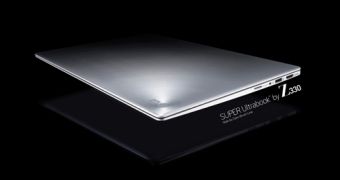Since this is basically still the beginning of the new year, estimates in regards to sales and marketing evolution are coming out one after another, and ultrabooks haven't been overlooked.
Juniper Research has just published what it expects to happen on the ultrabook market over the next half a decade, even drawing a comparison to tablets.
Basically, if everything goes well and the prices slide down as fast as Intel has promised, ultrabooks will sell by the tens to hundreds of millions.
In fact, it is the belief of the firm that the segment will prove to be even faster to grow than the tablet segment was and still is.
Though tablets will continue to stay in the lead, from a volume perspective, the new notebooks will not be slacking off at all.
By 2016, there should be shipment levels of roughly 178 million per year, while tablets will reach 253 million by that point.
“While Intel’s control of the brand ensures that Ultrabooks stand out from traditional notebooks, vendors face a balancing act in terms of product strategy” author Daniel Ashdown suggests.
“Meeting Intel’s specification secures brand status and funding, but the step-change from notebooks means many of today’s Ultrabooks are too expensive for many consumers.”
Product makers will probably start to use hybrid drives more often, in their effort to cut back on prices (pure SSDs are too expensive), while maintaining faster performance than that of regular hard disks.
As a reminder, hybrid drives are basically HDDs with a small amount of flash memory that stores the system boot as well as the most often accessed files.
Unfortunately, even if super-thin mobile personal computers meet expectations and ship well, there will be plenty of individual manufacturers that will struggle to keep up with the larger brands.
Finally, netbooks are expected to be reduced to little more than a niche market, if they don't disappear altogether. We already saw how they, and the Intel Atom chips, were basically doomed at this point.

 14 DAY TRIAL //
14 DAY TRIAL //